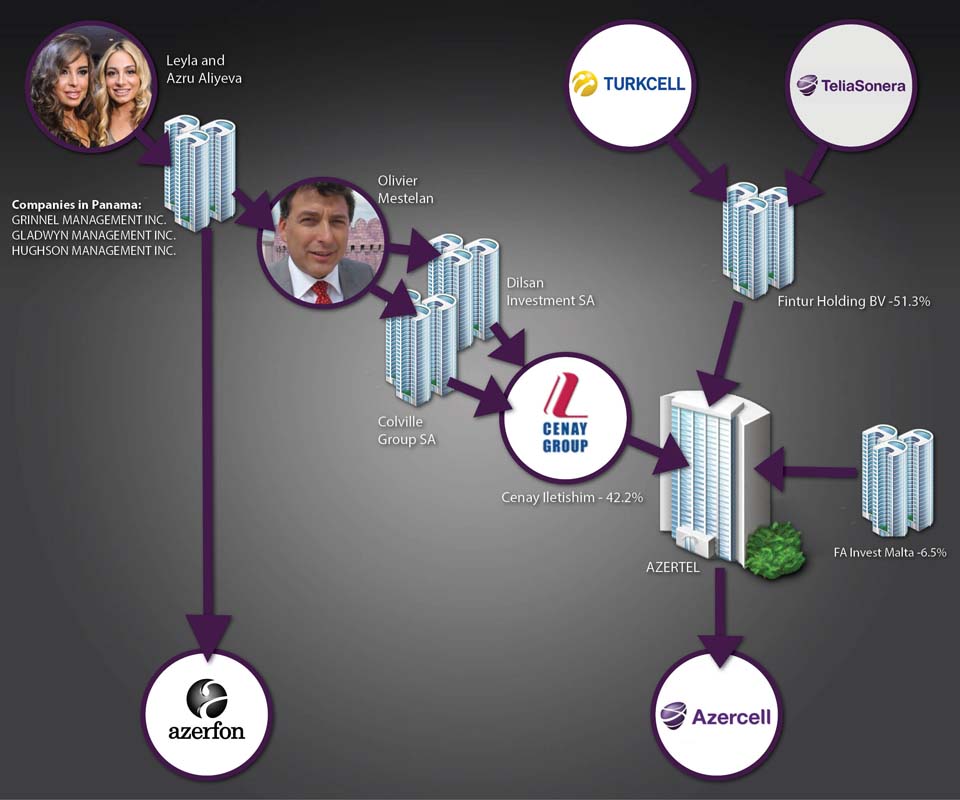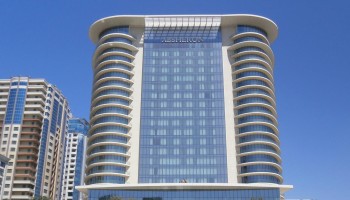They own most of Azerfon, the country’s third-biggest company. Now newly uncovered documents link the daughters through a trail of owners and offshore registrations to Azercell, Azerbaijan’s largest mobile phone business.
That means two out of the top three companies are closely connected to the Aliyev family—and, thanks to more complex offshore registrations, nobody is yet sure who owns the third.
The proven paper trail links the family to nearly three-quarters of the mobile market, a commercial dominance that raises serious questions about Internet surveillance and communications security within Azerbaijan.
It may also help to explain complaints about costly service.
These newly revealed links indicate more unusual ties between Swedish telecom giant TeliaSonera and Eurasian political figures than the company has publicly acknowledged, according to documents reviewed by the Organized Crime and Corruption Reporting Project (OCCRP) and Radio Free Europe/Radio Liberty (RFE/RL).
Swedish Problems
It has been a difficult 18 months for TeliaSonera.
In late 2012, Swedish TV and OCCRP revealed that TeliaSonera was being investigated for bribery in connection with US$ 320 million that was paid to a company run by a close friend and business partner of Uzbekistan’s ruling family in order to obtain a 3G license in that country.
In Azerbaijan, the surreptitious links between the ruling family and the country’s mobile phone companies raise questions about how real the competition can be among the top companies.
The answers lie in a complicated web of offshore and business records that connect Azercell, the company’s largest mobile provider, to the Aliyev daughters. TeliaSonera owns nearly 40 percent of Azercell.
After the affair in Uzbekistan, TeliaSonera changed its management roster and vowed to overhaul business practices and ethical standards. Company officials, however, refuse to discuss any specific actions they have taken or are taking in Azerbaijan.
Today Azerbaijan’s telecom market is split between Azercell, Bakcell and Azerfon. Azercell has nearly half the market, Bakcell has a third and Azerfon the rest.
Azercell was established in 1996 by the government and Azertel, a subsidiary of Turkcell in Turkey. TeliaSonera holds shares in Azercell through an offshore subsidiary called Fintur Holdings. Today the Swedish firm also owns shares of Turkcell in addition to its 40 percent of Azercell.
To understand the connections between the companies, follow the paper trail of a Swiss national named Olivier Mestelan, an art dealer and friend of the first family, who has frequently served as secretary in companies owned by the Aliyev daughters and whose name keeps popping up in telecom records.
For example, TeliaSonera’s partner in Azertel—a company called Cenay Iletishim—is represented by Mestelan. Mestelan also shows up in records linking Azerfon and Azercell.
With government figures connected to the Number 1 and Number 3 telecommunications companies in Azerbaijan, critics say these companies cooperate with the government to monitor phone calls and website visits on a massive scale. Media watchdogs say these hidden connections raise serious questions about Internet freedom and the extent to which government officials may be listening to citizens.
Rashid Hajili is the director of the Media Rights Institute in Baku, which monitors media and protects journalists’ rights. He says the Azerbaijani government heavily monitors the Internet and has a history of blocking websites that criticize it.
Hajili says the Ministry of Communication requires all communications companies to provide equipment and special facilities to the Ministry of National Security for surveillance. But while the companies have cooperated with Azerbaijani law enforcement by providing communications records in cases involving journalists and bloggers, Hajili says media rights advocates haven’t received equivalent information needed to defend those journalists.
Defense lawyer Elchin Sadigov says Azerbaijan’s mobile companies don’t even seek court approval to listen in, as required by law. “The court-order requirement was neglected in the case against journalist Avaz Zeynalli, when his colleagues -- all of them journalists working for Khural newspaper -- had been illegally monitored,” he says.
“All of the phone operators, including Azercell, provided access to recorded phone conversations without due legalities. The same happened in the case of the journalist Parviz Hashimli. In this case the investigation was conducted by the Ministry of National Security and, according to the indictment, they had full access to phone conversations.”
Amnesty International has declared Hashimli and Zeynalli “prisoners of conscience”.
Recent cases show how dangerous it can be for a government to have this much power.
Agil Khalil, a reporter for the Azadliq newspaper, has sued the Azerbaijani government in the European Court of Human Rights, alleging his telephone had been tapped illegally. Khalil, who says his carrier at that time was Azercell, is awaiting a verdict.
Khalil, who fled the country in 2008 after a series of attacks on him, has accused the Azerbaijani government and the mobile phone operator of plotting against him.
In 2008, Khalil was stabbed in the chest after publishing an article alleging that employees of the Ministry of National Security were involved in corrupt land deals in Baku. According to the Media Rights Institute, Azerbaijani law enforcement tried to present the attack as irrelevant to his work and to start a smear campaign against him, alleging that the journalist was stabbed by a jealous homosexual lover, Sergey Strekalin. The rights institute has led Khalil’s defense.
Khalil, who says he is not homosexual and has never met Strekalin, demanded that law enforcement investigate and punish the real attackers. Law enforcement ignored that and Strekalin, who testified on behalf of the prosecution, served less than half of an 18-month prison term.
The prosecutors’ office alleged that they had SMS exchanges between Khalil and Strekalin, provided by Azercell. Azercell, however, refused to provide those messages to Khalil or his lawyers. Khalil maintains that the messages are fraudulent and that he never sent them.
Activists say it is not only journalists who are victims of illegal activities involving the telecommunications companies.
When Nigar Yagublu, a youth activist and daughter of opposition party member Tofig Yagublu, was facing trial for a car accident, she learned that both her phone and that of her father were being tapped.
Investigators claimed that they obtained a court order permitting the wiretapping on the same day the investigation into the accident began. However, the indictment quoted conversations that took place immediately after the accident, proving that the listening had been underway before a court order could have been in place.
Competing Companies, Same Signature
As in other countries, the telecommunications industry in Azerbaijan has exploded over the past two decades, generating significant income for a public-private mishmash of companies and individuals.
Tracking who owns what can be a challenge.
When TeliaSonera’s subsidiary Azercell entered the Azerbaijani market in 1996, it was a joint venture between the government and Azertel, a Turkish company whose owners were Fintur Holdings (79.8 percent) and two Turkish companies: Cenay Iletishim and Cenay Insaat (10.1 percent apiece). TeliaSonera is the majority owner of Fintur Holdings.
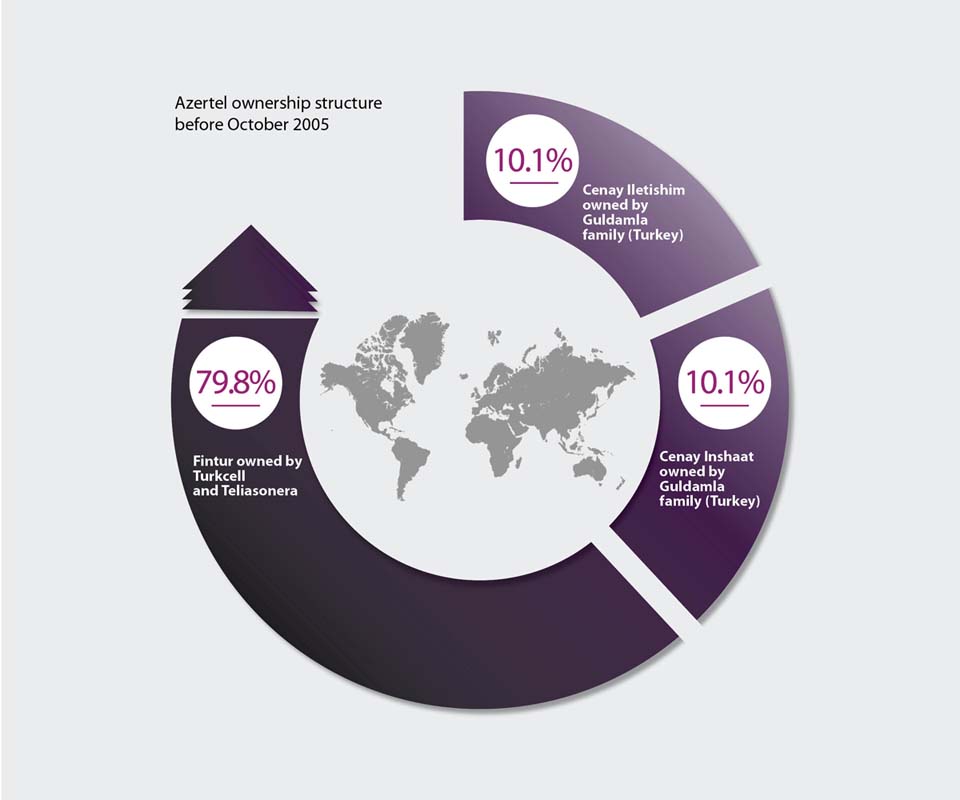 The ownership chain is confusing, because it involves twists and turns among five distinct Panamanian companies.
The ownership chain is confusing, because it involves twists and turns among five distinct Panamanian companies.
In November 2005, two Panamanian companies – Dilsan Investment SA and Colville Group SA -- bought Cenay Iletisim for 8.85 million Turkish liras (US$ 6.6 million) . In Panama, it is easy to hide true ownership of a company behind proxy names; the incorporation documents were signed by Olivier Mestelan, although he is not listed as an officer.
That same year, a new communications company—Azerfon--entered the country’s mobile phone market. The government bypassed tender procedure laws to grant Azerfon its license. Six years later--in 2011--journalists discovered that the Aliyev daughters owned 72 percent of Azerfon through three additional Panamanian companies: Grinnell Management; Gladwyn Management; and Hughson Management.
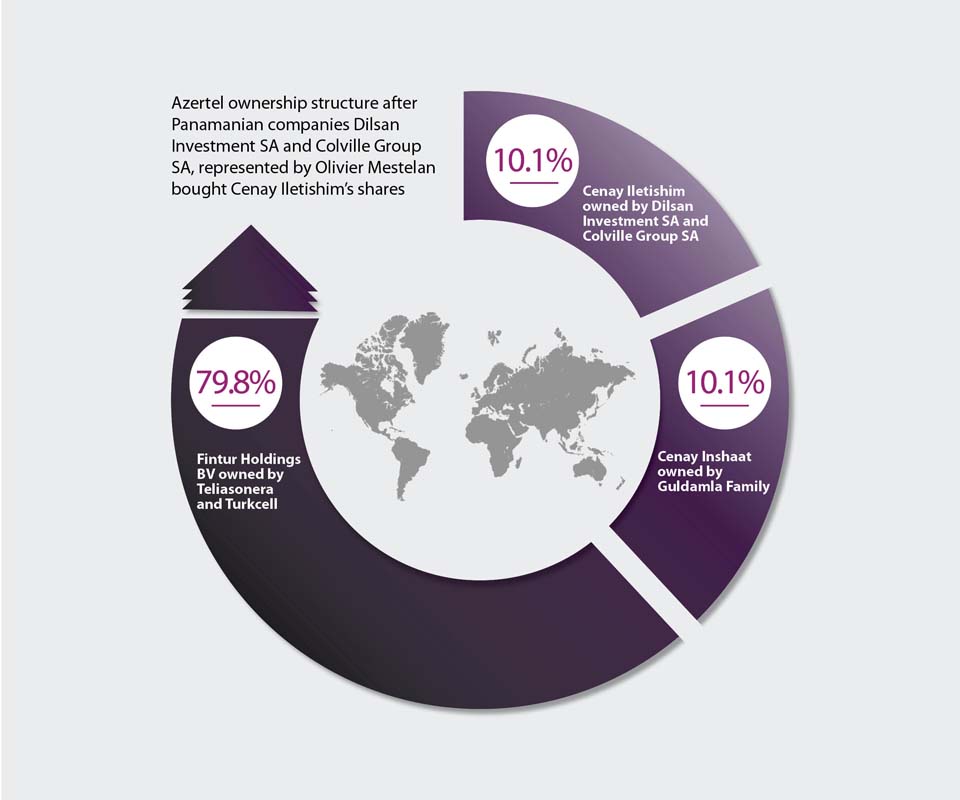 What do these Panamanian companies have in common? Olivier Mestelan.
What do these Panamanian companies have in common? Olivier Mestelan.
Leyla and Arzu Aliyeva alternate in the role of either president or treasurer of all three Panamanian companies, while Mestelan is listed as secretary of all three . Mestelan is a well-known figure in Baku who owns a high-end art gallery. His perceived relationship with the Aliyev family earned him a spot on a short list of people “of particular interest” compiled by the US State Department.
Mestelan has been profiled by Baku magazine, published by Leyla Aliyeva in Moscow. She is also an editor-in-chief.
Mestelan also sits on the advisory board of Ata Holding, yet another Panamanian company controlled by Hughson Management, where Arzu Aliyea is president, sister Leyla is treasurer and Mestalan is secretary.
Mestelan is also connected to one of the companies that owns Azercell. His signature appears on the Panamanian incorporation for Dilsan Investment but documents do not list any position he holds. A search in the Turkish Official Business Gazette finds Mestelan listed as a signatory for both Dilsan Investments and Colville Group, the two Panamanian companies that bought a 10.1 percent share of Azercell in 2005.
In 2008 the government of Azerbaijan sold its 35.7 percent share of Azercell to its Turkish-Swedish-Panamanian partner Azertel for US$ 180 million. After the Azertel partners each raised their investment stakes by varying amounts, Fintur Holding owned 51.3 percent, Cenay Iletishim owned 42.2 percent, and Cenay Insaat owned 6.5 percent.
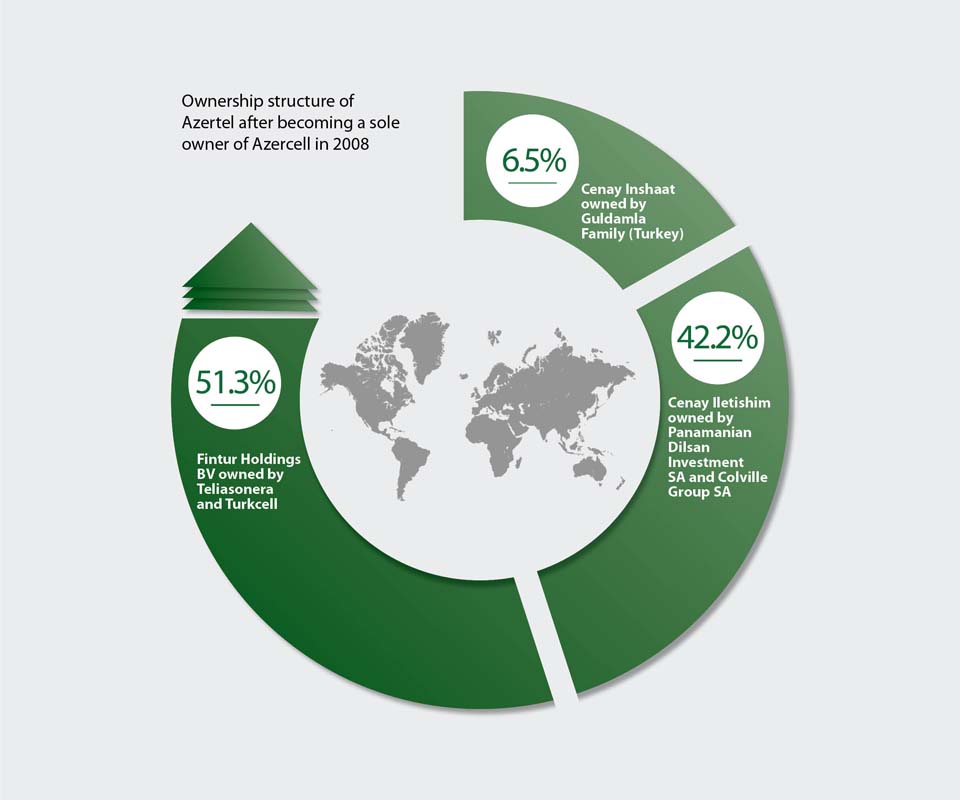 It was a lucrative deal for the Cenay Iletishim owners . According to Azertel financial reports listed in the Turkish Official Business Gazette, from 2006 to 2012 Cenay Iletishim received dividends worth at least US$ 249 million while investing only US$ 95 million, for a profit of US$ 154 million. It is not clear who ultimately owns Cenay Iletishim.
It was a lucrative deal for the Cenay Iletishim owners . According to Azertel financial reports listed in the Turkish Official Business Gazette, from 2006 to 2012 Cenay Iletishim received dividends worth at least US$ 249 million while investing only US$ 95 million, for a profit of US$ 154 million. It is not clear who ultimately owns Cenay Iletishim.
Despite its indirect links with the ruling family, Azercell spent six years trying to get a license to provide 3G service to its mobile phone customers. Azerfon – the competing company controlled by the Aliyeva sisters – held the 3G monopoly until the end of 2011.
At about the same time that Azercell finally received a 3G license, a newly-formed company, FA Invest Malta Limited, took over the 6.5 percent shares from Cenay Inshaat. FA Invest was incorporated in Malta and its ownership structure is hidden.
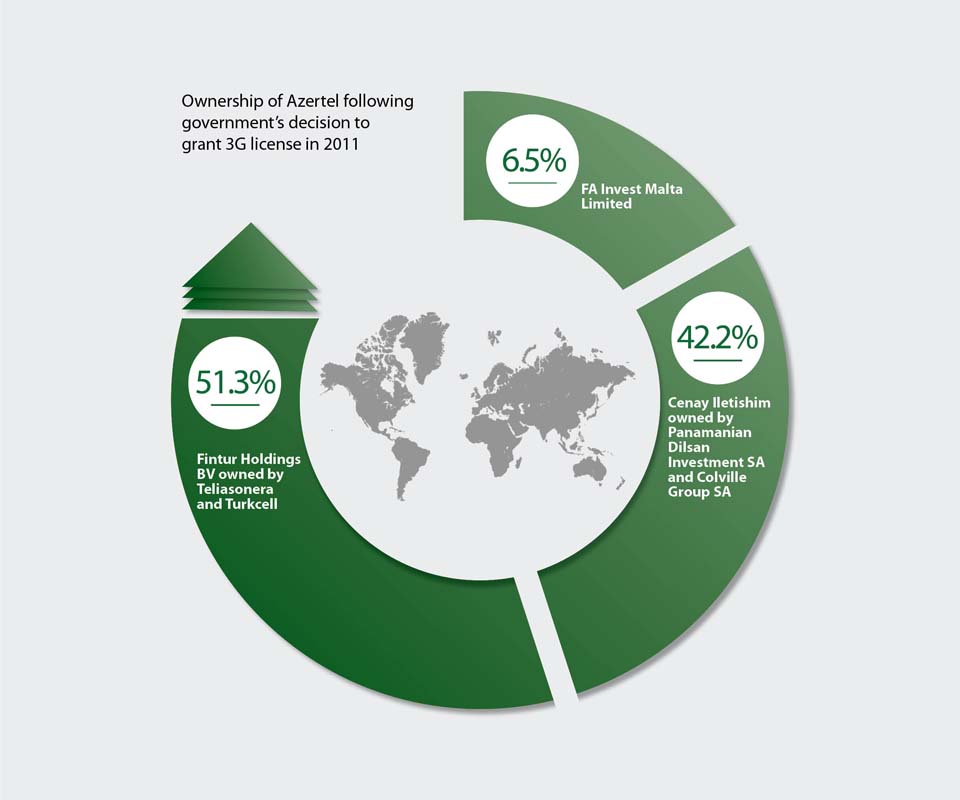 But according to the Turkish Official Business Gazette, Azerbaijani citizen Hamzayev Rashad Firidunoglu was appointed to represent FA Invest Malta Limited at Azertel board meetings. A person by the same name is a major in the Special State Guard Service, responsible for the President’s personal security. His names appears on a list of Guard Service employees who received special awards “For the service to motherland” from Aliyev in 2010.
But according to the Turkish Official Business Gazette, Azerbaijani citizen Hamzayev Rashad Firidunoglu was appointed to represent FA Invest Malta Limited at Azertel board meetings. A person by the same name is a major in the Special State Guard Service, responsible for the President’s personal security. His names appears on a list of Guard Service employees who received special awards “For the service to motherland” from Aliyev in 2010.
Hamzayev did not respond to a request for comment.
In its 2013 annual report, TeliaSonera noted the formation of a new Sustainability and Ethics Committee and listed “anti-corruption” as a focus area.
When asked about the ownership of Azercell and whether the company had begun to take promised measures, including renegotiating or even terminating agreements with business partners, Salomon Berkele, head of external communication for TeliaSonera said the company would not go into further detail.
The Appearance of Competition
The near-monopoly on mobile phone service may also be driving up prices.
Baku resident Jahangir Alibeyzade juggles daily with three phones. He says the only way to afford phone communication in Azerbaijan is to have simcards from three different operators. Calls between carriers are too expensive. Even with this trick, mobile communication tariffs are still too high, Alibeyzade says.
Azerbaijan charges one of the most expensive mobile call tariffs in the area:
| Country | Price for prepaid minute in Euros |
| Azerbaijan | 0.09 |
| Georgia | 0.09 |
| Latvia | 0.07 |
| Armenia | 0.06 |
| Lithuania | 0.06 |
| Ukraine | 0.05 |
| Estonia | 0.05 |
| Kazakhstan | 0.05 |
| Russia | 0.03 |
| Iran | 0.03 |
Source: http://www.numbeo.com/cost-of-living/prices_by_country.jsp?displayCurrency=EUR&itemId=32
Kamal Mahammadli, who also uses three sim cards, says operators charge nearly the same rates, because there is no real competition. Alibeyzade also thinks there is no free market. Ahmed Mahmudov, who lives in the town of Agdash and works in a shop selling construction materials, has his own explanation for why he couldn’t choose among the three operators:
“They claim they have different campaigns and cheaper prices, but at the end of the month you see that you didn’t pay less for using their services,” he says.
Asked why the existence of three competitors doesn’t reduce prices, Mahmudov says, “Your logic doesn’t work here. We have our own logic in this country.”
The Azerbaijani government and the three companies claim there is competition but did not answer questions from OCCRP and RFE on the ownership structures.




